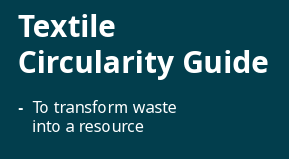
Publications
Discover the publications from the ECOSYSTEX community and its members.
Videos are available on ECOSYSTEX’s YouTube channel.
Filter by projects
VERDEinMED launches Knowledge Platform
VERDEinMED’s Knowledge Platform brings together cutting-edge medical insights, expert resources, and practical tools to empower healthcare professionals and researchers worldwide.
RegioGreenTex: From Regions to a Circular Europe
This brochure summarizes pilot results, highlighting progress, impact, and scale-up opportunities, while guiding companies and regions toward collaboration and market adoption.
RegioGreenTex: Textile Circularity Guide – for a circular textile future
As part of the RegioGreenTex project, the Textile Circularity Guide outlines how textile waste can be turned into resources through circular business models, digital tools, and collaboration. It provides practical strategies, business development tools, digital solutions, and showcases successful European collaborations.
RegioGreenTex's Italian GreenTex Hub: Boosting Circularity in Textile Sector Services and Opportunities from Italian Textile Ecosystems
This deliverable is a practical guide to driving circular transformation across the textile value chain, providing tools and frameworks for companies, associations, and policymakers to scale sustainable practices effectively.
RegioGreenTex: The Circular Garment
Read more and watch the documentary to see how RegioGreenTex created ‘The Circular Garment’, a durable, unisex piece made from recycled fibers using innovative, circular textile techniques, developed through collaboration across 12+ SMEs and research centers in 8 European regions.
T-REX project report: business models & financial viability
As part of the T-REX Blueprint for scaling textile-to-textile recycling in Europe, this report presents key insights from the Techno-Economic Assessment (TEA) on the business viability of circular textile systems.
T-REX life cycle assessment & plastic leakage analysis report
As part of the T-REX Blueprint for scaling textile-to-textile recycling in the EU, T-REX presents a summary report of the Life Cycle Assessment (LCA) and Plastic Leakage Analysis conducted by consortium partner Quantis.
Green VETRINE free online course
Green VETRINE has been developed by leading European training organisations in the textile and clothing sector, and delivers a European certificate for successful completion. The course is also available in seven languages.
T-REX’s technical guidance for recyclable garments
This guidance brings together key insights from research conducted during the T-REX project, offering practical, detailed advice on how to create recyclable garments while stepping away from the mono-material approach.
T-REX project reveals textile recycling blueprint
Following the successful completion of the 3-year innovation programme, the T-REX Project is pleased to present its recommendations for the scaling of textile-to-textile (T2T) chemical recycling in Europe.
T-REX Project Report: Piloting a data model for textile-to-textile recycling
The textiles industry faces major environmental challenges, from high carbon emissions to overwhelming amounts of post-consumer waste. To tackle these issues, the T-REX Project has been working to build a blueprint for a closed-loop system for textiles.
RegioGreenTex Infrastructure Database
To accelerate the green transition in the textile sector, RegioGreenTex is mapping accessible R&D infrastructure across Europe, from testing laboratories and pilot lines to specialized machinery and expert support. This database helps SMEs identify the right expertise and equipment before making major investments themselves.
SOLSTICE's Territory Profile: Catalonia
The SOLSTICE project, funded by the EU’s Horizon Europe programme, aims to tackle the textile industry’s challenges by piloting circular solutions in Catalonia.
SOLSTICE's Territory Profile: Grenoble
The SOLSTICE project, funded by the EU’s Horizon Europe programme, aims to tackle the textile industry’s challenges by piloting circular solutions in Grenoble.
SOLSTICE's Territory Profile: Prato
The SOLSTICE project, funded by the EU’s Horizon Europe programme, aims to tackle the textile industry’s challenges by piloting circular solutions in Prato.
SOLSTICE's territory profile: Berlin
The SOLSTICE project, funded by the EU’s Horizon Europe programme, aims to tackle the textile industry’s challenges by piloting circular solutions in Berlin.
RegioGreenTex: Eco-Design Strategies
RegioGreenTex developed this report to promote open dialogue in building a sustainable textile supply chain. Ecodesign thrives through collaboration between designers, producers, distributors, and those involved in recovery, repair, and reuse. This guide is the result of a joint effort between Next Technology Tecnotessile and the Service Design Lab at the University of Florence.
SOLSTICE's report on analysis of consumer research
This report aims to summarise findings about consumer behaviour related to circular textiles in the four territories: Catalonia, Berlin, Prato, and Grenoble as researched under the SOLSTICE project.
T-REX Project White Paper on Advancing Textile Circularity: Policy Recommendations for Implementing ESPR in the EU
T-REX Project released a white paper providing strategic recommendations for policymakers to facilitate a robust and sustainable textile recycling ecosystem in the EU.
Waste2BioComp’s report on benchmarking and technology watch
This report represents the final version of the Report on benchmarking and technology watch. It describes W2BC strategic benchmark and technology watch. Benchmarking strategic tool assists in the achievement of excellence, enabling improvement by borrowing and adapting the successful ideas and practices of organizations while avoiding unproven or problematic strategies.




















